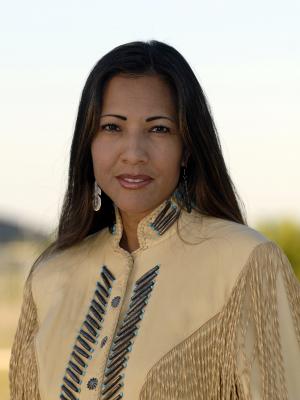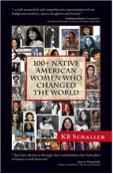By Angeline P. Hoffman, White Mountain Apache Reservation
 Stories of Indigenous people matter because these stories influence how we think about ourselves, where we come from, and help formulate the way in which we think about our own cultural perspectives and people.
Stories of Indigenous people matter because these stories influence how we think about ourselves, where we come from, and help formulate the way in which we think about our own cultural perspectives and people.
A topic emerging from our culture includes the significant cultural roles represented within our communities and families. Elders play a critical role within Indigenous communities. One of the unique ways American Indian people obtain knowledge is through the direct teaching of elders. They are the keepers of knowledge. Elders enter a period of life that allows them to continue teaching and learning, using their vast stores of acquired knowledge. That knowledge is shared at the discretion of the elder and only with those who demonstrate a readiness to learn. Learning is perceived as a life-long process that is developmental in nature. It reflects the readiness of the learner, not necessarily an imposed time frame frequently experienced within mainstream education.
I have created a text set of Indigenous children’s literature based on native peoples. Each book has different insights.
 Native Elders: Sharing Their Wisdom (Signafus & Ernst, 2014). This book consist of biographical essays of twelve First Nation, Indigenous elders who share stories from their lives and explain how their humble childhoods shaped them into the adults they became and the lessons they share as elders.
Native Elders: Sharing Their Wisdom (Signafus & Ernst, 2014). This book consist of biographical essays of twelve First Nation, Indigenous elders who share stories from their lives and explain how their humble childhoods shaped them into the adults they became and the lessons they share as elders.
In my research of Indigenous culture, the important role of women has emerged. They are very significant to Indigenous people because they are the Givers of Life. Woman is the co-creator. Without women there would no life. Women play strong roles as nurturers of generosity, kindness, pride and strength. Poise and confidence are necessary for the behavioral values and characteristics in all aspects of life. The following book demonstrates how important roles of the Indigenous Women are.
 Native Women of Courage (Fournel, 2007). These biographies are of ten Indigenous women, both historic and contemporary, who followed their paths, challenged traditional stereotypes and fought discrimination against Indigenous people.
Native Women of Courage (Fournel, 2007). These biographies are of ten Indigenous women, both historic and contemporary, who followed their paths, challenged traditional stereotypes and fought discrimination against Indigenous people.
Most Indigenous cultures refer to themselves as people, and they identify the “Great Spirit” as father. In the Apache world, as well as those of other Indigenous Nations, men had an important role in the culture. The men were aware of their physical prowess, and took an authoritarian leadership role over their people. The important role of men is reflected in the following books.
 Native Men of Courage (Schilling, 2008) profiles ten outstanding leaders from the Indigenous community. Each man overcame personal challenges and achieved extraordinary accomplishments.
Native Men of Courage (Schilling, 2008) profiles ten outstanding leaders from the Indigenous community. Each man overcame personal challenges and achieved extraordinary accomplishments.
 Native Athletes in Action! (Schilling, 2007) are stories of many Indigenous athletes who have excelled in the field of sports, from the Olympics to national and minor league teams.
Native Athletes in Action! (Schilling, 2007) are stories of many Indigenous athletes who have excelled in the field of sports, from the Olympics to national and minor league teams.
 Native Writers: Voices of Power (Sigafus & Ernst, 2012). Read captivating stories about the lives and ambitions that shaped the voices of ten influential contemporary native writers. Their life stories will inspire young readers to continue their education and reach for their own success.
Native Writers: Voices of Power (Sigafus & Ernst, 2012). Read captivating stories about the lives and ambitions that shaped the voices of ten influential contemporary native writers. Their life stories will inspire young readers to continue their education and reach for their own success.
 Native Defenders of the Environment (Schilling, 2011). The eleven native individuals profiled in this work defend the environment and the rights of Indigenous people in the Arctic National Wildlife Refuge in Alaska; the tar sands in Alberta, Canada; Black Mesa in Arizona; nuclear-free-zones; and other environmentally sensitive sites across North America.
Native Defenders of the Environment (Schilling, 2011). The eleven native individuals profiled in this work defend the environment and the rights of Indigenous people in the Arctic National Wildlife Refuge in Alaska; the tar sands in Alberta, Canada; Black Mesa in Arizona; nuclear-free-zones; and other environmentally sensitive sites across North America.
 American Indians: Stereotypes & Realities (Mihesuah, 1996). This book provides insights into the racial identity and cultural struggles of American Indians. They work to establish a successful program to confront the literature of false portrayal and negative images of Indian people. This book will be a very useful reader for anyone truly trying to understand who American Indians really are.
American Indians: Stereotypes & Realities (Mihesuah, 1996). This book provides insights into the racial identity and cultural struggles of American Indians. They work to establish a successful program to confront the literature of false portrayal and negative images of Indian people. This book will be a very useful reader for anyone truly trying to understand who American Indians really are.
 100+ Native American Women Who Changed The World (Schaller, 2014), This book is a collection of historical and contemporary biographies of women of Indigenous heritage who have contributed to the survival and success of their families, communities and the United States of America. Especially look at chapters 74, 75, 76, 77. Extra: Apache 8: The Movie . . .
100+ Native American Women Who Changed The World (Schaller, 2014), This book is a collection of historical and contemporary biographies of women of Indigenous heritage who have contributed to the survival and success of their families, communities and the United States of America. Especially look at chapters 74, 75, 76, 77. Extra: Apache 8: The Movie . . .
These are only a few books about Indigenous people. Next week I will provide a new text sets of Indigenous Children’s literature from the United States.
Journey through Worlds of Words during our open reading hours: Monday-Friday, 9 a.m. to 5 p.m. and Saturday, 9 a.m. to 1 p.m. To view our complete offerings of WOW Currents, please visit archival stream.
- Themes: Angeline Hoffman, Indigenous
- Descriptors: Books & Resources, WOW Currents

Hello…
I found your words, above of – “That knowledge is shared at the discretion of the elder and only with those who demonstrate a readiness to learn”…insightful. In my culture (white) such insight…has been lost. Or never learned. Originally growing up as a ‘farmer kid’ in North Dakota – I was never taught about ‘other cultural thought’ and ways. Then – wanting to ‘escape the farm’, I joined U.S. Special Forces – which took me multiple places in the world. Interacted with many cultures. As a medical personal within that unit, I was blessed with ‘interacting and sharing with each culture’ that we visited and assisted. Retired after 22 years of that back in 1999, I have not lost my wonder and appreciation for such. Currently my wife of 40+ years are sharing culture back and forth with an Arapaho woman about my age (64) and we are both…learning. And it is a blessing. Thank you for what you do. (Deane Schultz, Clarksville, TN, U.S. military ret)